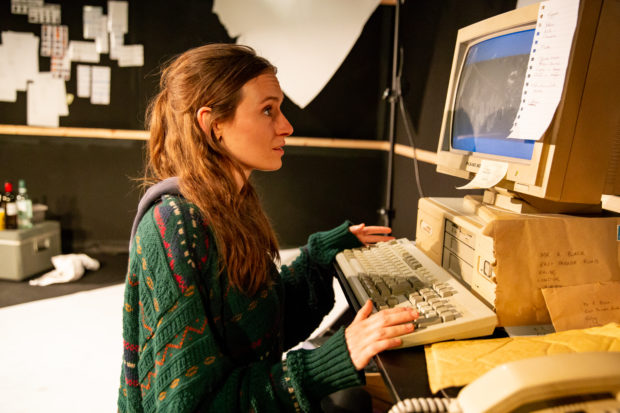You have no items in your cart. Want to get some nice things?
Go shopping“I was never in the business of exploiting women. I was in the business of exploiting men,” says Ross Black, a middle aged man with a sleazy haircut. Kate, Ross’s ex-girlfriend of 20 years, isn’t convinced, but her accusations seem a little tongue-in-cheek.
It’s the 1990s and Kate has travelled to a failing photography studio located next to a crack den in Hounslow to see this man. Is it revenge she’s after? Or does she just want him back? And how does Terri, the waif-like lodger/assistant who has lived with Ross ever since he found her sleeping on his doorstep, fit into all this?
Ross Black (Stephen Riddle) is a semi-retired glamour photographer who, in Kate’s words, would coax 19/20-year-old women into getting naked in front of a camera. Kate (Anna Tymoshenko) comes to Ross’s new studio under the pretence of having some brochures for her cosmetics business printed, but she really wants to tell him that Bryony Summers, a former glamour model who worked with Ross, has tried to commit suicide by slashing her face after a botched plastic surgery operation put a stop to her “impossible beauty”. According to Kate: “Bryony became addicted to a level of admiration she could only get one way.”
Bryony’s story is one of the more interesting parts of this play which could have been explored in more detail; this Dorian Gray style obsession with beauty and fear of ageing is always relevant. Exploring how that could affect a glamour model whose entire career and self-esteem is tied up in her looks is thought provoking. If she had been the protagonist, or even appeared in the play at all, then the themes of disappointment, exploitation and male fantasy could have been explored in much more detail.
Unfortunately, Bryony isn’t central to the play. Eros, by commercial copywriter turned playwirght Kevin Mandry, is one hour and ten minutes long but, despite the dense subject matter, the play is mostly filled with Kate and Ross reminiscing and lightly flirting with each other.
Despite Kate’s apparent outrage at Ross’s treatment of Bryony, she seems far more concerned with getting him to kick-start their relationship than she does with any moral outrage. Kate’s character feels uncomfortably stereotypical; the middle aged female spinster who, despite her career success, spends her days mourning for the children she never had.
In Greek mythology, Eros was the god of attraction – the word erotic derives from it. So, what is Eros the play about? Exploitation in the glamour modelling industry? Society’s never-ending obsession with beauty? How technology was changing the world in the ‘90s?
These themes are all woven into the play, but they feel like missed opportunities. The stage is suitably ‘90s with its grey, bulky computer, and Terri’s talk of using the internet for advertising and making friends reminds us of how different the world is just 30 years later. But the play never fully explores how technology was changing the world and the effect it would have on glamour models and the sex industry. The fall of the iron curtain is another interesting theme in this play. Ross is planning a “photography trip” to Prague with his ex-partner, and it deserved more attention than it was given.
Despite her half-hearted nods towards feminism, Kate’s sole motivation appears to be coaxing this man into moving into her huge country house. She was never a model and her moral indignation appears to stem from jealousy – that her boyfriend seemed more enamoured with his models than with her. “He is a man who can only love one way – through a lens,” she says.

Terri’s character is interesting, but her monologues don’t quite fit with the rest of the story. She is clearly a vulnerable girl who, despite his temper, Ross has been kind to. She is also there to make random comments about the internet – “online, you can be yourself” – but she seems to have been written in as a quirky redemption arc. Felicity Jolly gives a good performance, but it’s hard to identify with Terri because her backstory doesn’t always make sense and seems a little forced.
When men write female characters, there is a danger that they will rely on stereotypes out of assumption and lack of personal experience. Eros appears to be about the exploitation and later neglect of vulnerable young women, but it isn’t. It ends up showing that Ross, despite his questionable younger antics, is now a fairly decent guy.
Kate, on the other hand, comes across as a sad, crazy-ex girlfriend type. There are parts in the script that try to explore the male ‘obsession’ with fantasy, but they don’t feel nuanced enough.
The exploitation arc never really works because no one who was exploited is ever given a voice to explain how they feel. They are spoken for by a woman who is jealous of them and a man who idolises but ultimately forgets them. Terri’s character has potential, but she seems incapable of doing anything but latching on to Ross, despite him saying horrible things about her appearance and generally treating her poorly. It feels like Eros is trying to make a point about men, but it is really stereotyping women.
Eros promises to explore many worthy themes: how the internet changed society, how modelling can impact self-esteem, exploitation in the glamour industry, regret in middle life and how the fall of communism led to new opportunities to exploit Eastern European women. While Eros is good at identifying these themes, it doesn’t know what to do with them.
Eros will play at White Bear Theatre until 15 September.
About Sophia Moss
Sophia Moss is a theatre reviewer for The Upcoming and The Reviews Hub. Also freelances for Prospect magazine, Ethiad Atlas, Sticky Content and The Sun.




